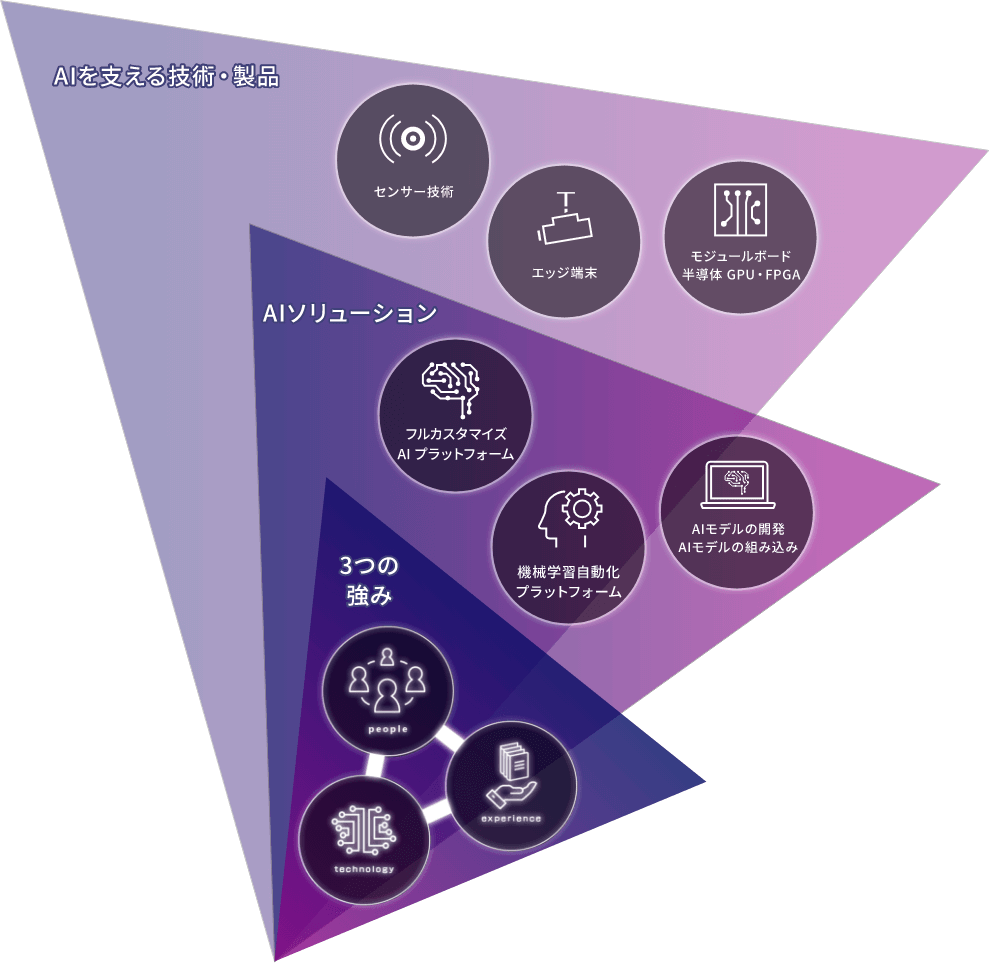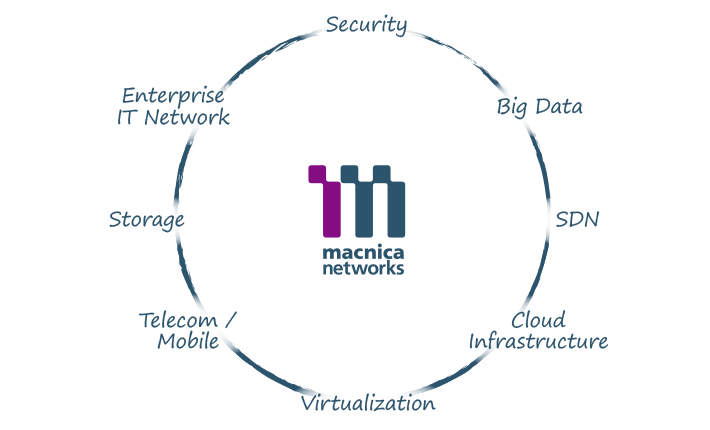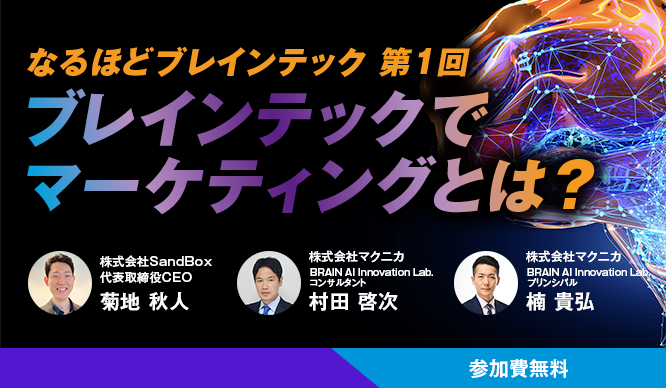Macnica is a semiconductor trading company that boasts the No. 1 market share in Japan (*1) and sales of 1 trillion yen (*2), and has 92 bases in 26 countries and regions around the world.
Founded in 1972, we have built a solid track record as a trading company specializing in semiconductors, and have transformed into a technology trading company that focuses on technical support. Furthermore, with the goal of 2030, the company aims to transform its business into a “service solution company” that creates high social value by combining cutting-edge digital technology and the company’s intelligence. The key to successful transformation is data-driven marketing that actively utilizes data and technology.
This time, we asked Mr. Shiro Horino, who is the company’s marketing manager and also serves as the leader of the Japan Data Management Consortium (JDMC) awards committee, about Macnica’s unique strengths and characteristics, as well as his thoughts on realizing business transformation. We talked about marketing to take it to the next level.
(*1) According to Gartner research (Gartner Market Share: Semiconductor Distributors, Worldwide, 2021, Masatsune Yamaji, 9 March 2022, Revenue Basis)
(*2) FY2022 results
From a specialized semiconductor trading company to a technology trading company to a service solution company
–First of all, please tell us about Macnica’s business.
Shiro Horino
(hereinafter referred to as Horino) Macnica’s first pillar is the semiconductor business, which is synonymous with the company.
As a semiconductor distributor, we boast the largest market share in Japan, and with our industry-leading product portfolio, we offer a wide range of products including medical equipment, semiconductor manufacturing equipment, automobiles, computers, consumer equipment, communication equipment, communication infrastructure, OA and peripheral equipment. We supply products that support various industrial fields on a global scale.
The second pillar is network business.
Specifically, we mainly focus on cybersecurity networks, AI/data, and DX applications, and utilize our global network that covers not only Japan but also Asia and the Middle East to provide cutting-edge technology and intelligence to countries around the world. I am.
With these two as our main business pillars, we are continuing to grow steadily, with sales exceeding 1 trillion yen in the fiscal year ending March 2023.
–When you think of Macnica, you have a strong image of it being a trading company specializing in semiconductors. At the same time, we have a solid track record in network business. Will you continue to accelerate this trend?
Horino:
That’s right. As part of our long-term management plan to take us to the next level, we have set the goal of becoming a “service solution company” by 2030.
Specifically, we are developing our business by setting six business themes based on three materialities.
1.Business & Economy:
This business is based on the themes of “smart manufacturing” and “CPS (Cyber-Physical System) security.” This solves issues such as a shortage of labor at production sites and a lack of successors.
2. Life & Society:
We provide smart cities/mobility with total smart mobility including self-driving vehicles. We are developing a healthcare business aimed at developing personalized medicine and preventive medicine in a super-aging society.
3. Green & Earth:
We aim to achieve carbon neutrality and create a recycling-oriented society by utilizing renewable resources, and are developing businesses based on the themes of circular economy and food agritech.
These initiatives play a part in realizing a sustainable future society through services and solutions that utilize AI and IoT.
–This is a new challenge for us, armed with a wealth of products that cover the world’s major devices, overwhelming know-how, and the technological capabilities that come from this.
Horino:
Until now, the public’s impression of Macnica was that it was a trading company specializing in semiconductors, but we were able to transform into a technology trading company by adding a new element of technology. In the future, we aim to transform into a “service solution company” that integrates these. Our goal is to have both companies and the general public think, “Macnica is a service and solution company.”
The source of these unrelenting challenges is Macnica’s corporate culture and culture, which is based on founder Haruki Kamiyama’s unwavering corporate philosophy of “continually sowing seeds at our feet.”
As a technology trading company, we are always aware of how to respond to future changes throughout the company. By anticipating trends in the world, identifying technologies that can become mainstream, and widely disseminating them to the world, we will become a presence needed by society. The phrase “keep sowing seeds at your feet” can be said to be a clear expression of Macnica’s attitude.

Creating new value by leveraging global synergies
–From your point of view, Mr. Horino, who is taking the lead in marketing new challenges, what do you think Macnica’s strengths are?
Horino
Today’s Macnica is not only a trading company, but also a company that can develop solutions through in-house development and collaboration with ecosystem partners, and we have problem-solving capabilities and implementation that can meet the needs of all industrial fields with cutting-edge technology. Power is a weapon.
Furthermore, as we are a global company with 92 bases in 26 countries and regions around the world, with our headquarters in Japan, we are able to quickly catch up on overseas technology trends that have not yet appeared in the world and be the first to incorporate them into our own business. There is also the strength of being able to
One of our strengths is that we can approach a wide range of markets, as our customers range from not only national manufacturers who incorporate semiconductors into their products to semiconductor manufacturers, engineering companies, and tech companies.
Taking full advantage of this structure, strong assets and resources, and global network, we are also working on new initiatives, such as the verification and implementation of self-driving mobility.
To make this a reality, we will establish a new company, GAUSSIN MACNICA MOBILITY, with the aim of developing autonomous, zero-emission mobility, in collaboration with France’s GAUSSIN, a pioneer in freight transportation EV and hydrogen fuel cell technology. We have taken over the business of France’s NAVYA, and are verifying and implementing self-driving EV bus solutions with the aim of implementing Level 4 self-driving in society.
So far, we have conducted social demonstration experiments, test operations, and regular operation of self-driving EV buses in local governments such as Hitachiota City, Ibaraki Prefecture, and Yokohama City, Kanagawa Prefecture, and have been featured in the news media.
In addition, we have entered into a partnership agreement with icetana, an Australian security company that specializes in video analysis solutions, and are developing cutting-edge facility security solutions. Recently, we announced a next-generation security solution that combines Panasonic EW Networks Co., Ltd.’s image analysis solution with Macnica’s anomaly detection software.
These are just examples, but one of Macnica’s great strengths is its ability to continually create new value based on global synergies. We have a specialized team within our company that evaluates and verifies overseas technologies, and the process is to explore technologies and services that have not yet been released, think about what can be done with that technology, and commercialize it. We have a system that can lead the way. In addition to the initiatives I introduced, there are many cutting-edge projects running in parallel.

We are an official NVIDIA distributor and have a GPU software solution development team.
–Macnica is also known as the primary distributor of NVIDIA.
Horino
: That’s exactly what you said. As an official NVIDIA distributor, Macnica is also a company with one of the largest sales records in Japan.
Among NVIDIA products, our specialty stores do not handle image processing systems, but supercomputer products such as workstations for AI development and embedded products.
We also have an in-house software development team for NVIDIA’s GPU (graphics processing unit), and we are also developing solutions centered on AI systems that use the company’s GPUs.
In addition, products such as “Omatome Ninja,” an AI solution that automatically creates documents such as minutes, daily reports, and reports, have been created using only voice input. Although many technologies related to generative AI have appeared on the market, our products have also attracted attention, and we have received numerous inquiries and inquiries as solutions that support the promotion of DX in companies.

Emphasis on data-driven marketing that utilizes data and technology
–Then, please tell us about Macnica’s marketing system.
The Horino
Marketing Team has a headquarters called the Marketing Department, and directly under it are the DX Marketing Department, Field Marketing Department, and the Marketing Operations Department, which I am also the director of.
The “Marketing Operations Department” is a team that provides behind-the-scenes support for the execution team, supporting the “Field Marketing Department,” which translates marketing strategies into concrete actions. We support strategic marketing execution, including lead management, data management, visualization using BI tools, and process design.
On the other hand, we also have a marketing team on the business division side. We have marketing teams tied to each new business, such as semiconductors, cyber security, and the ones we have already introduced, and work organically with other marketing teams to develop marketing that supports business growth.
–Is there anything you value when developing marketing?
At
Horino
Macnica, we have a culture that values “objectives,” “strategies,” and “tactics” before tackling a project.
In order to ensure that marketing and even inside sales produce results, we are also preparing initiatives for ABM (account-based marketing), supporting the realization of a strategic sales approach and using data and technology. We will pursue driven marketing.
Additionally, as part of our marketing, we value branding and lead generation through a large-scale conference called MET (Macnica Exponential Technology).
Since 2020 during the coronavirus pandemic, MET has been holding an event every year for a variety of customers, targeting co-creation partners, important customers, and future customers, with the concept of “observing cutting-edge technology and creating the future together.” This is an online event. We perform branding and lead generation through content such as cutting-edge technology trends, market summaries, implementation examples, and co-creation examples. From 2023, we have started holding real events on an invitation-only basis.
As other lead generation measures, we hold individual events for each business, such as “Semiconductors,” “Security Networks,” and “New Business: CPS (Cyber Physical Systems),” as well as events sponsored by suppliers and “RX JAPAN.” We also participate in large-scale international exhibitions such as “CES” and “CES,” and are also focusing on information dissemination activities such as introduction examples and product introductions.
In this way, we design strategies according to our objectives and pursue uniqueness. At the tactical layer, we focus on output (=content provided) to maximize communication with the target audience. Macnica’s marketing is to create business opportunities by having people feel the value of Macnica through various online and offline measures, and by having them participate in our company’s key events and creating effective communication. I can say it.

Macnica’s marketing style actively utilizes technology
–Earlier, you talked about “data-driven marketing that utilizes data and technology.” What kind of technology are you using to make it a reality?
HorinoOur
company also has a “Marketing Technology Team” whose mission is to derive efficiency and optimization of marketing from a technological perspective, and this department selects technologies such as CMS, DAM (digital asset management) tools, user analysis tools, etc.・We evaluate the results and incorporate them into our own marketing.
We also have a “Data Management & Analytics Team,” which integrates various data and third-party data, improves analysis accuracy and expands its scope, and visualizes analysis results using BI tools.
–What is your specific role, Mr. Horino?
HorinoAs
I mentioned earlier, my position is basically that of the person in charge of the corporate marketing department, which supports the field marketing side, which translates marketing strategies into concrete actions and executes them. However, I am also responsible for some of the multiple field marketing tasks.
We are also designing a framework and creating a roadmap from scratch to aim to become a service solution company by 2030. Specifically, in addition to designing a framework for marketing strategy planning, marketing operations, and sales enablement to support company-wide business strategies, I also worked on selecting the technologies and tools necessary to implement these, and on demand center management. We are currently preparing for launch and accumulating knowledge to effectively utilize AI.
As part of creating a system to support our business strategy, we would like to be able to make suggestions to the sales side about products that are likely to be effective for each customer and effective schemes. To this end, we plan to integrate the formats of the data we handle, work to improve the precision of data analysis using AI, and standardize business processes that vary by division.
Every move we make is a stepping stone to becoming a service solution company and a one-team effort.

Changes and effects of intelligent marketing
–What was marketing like before you started working on today’s intelligent technology?
Horino:
Up until now, there has been a strong sense that “marketing is something that each business department approaches in its own way,” and I feel that marketing has had a strong emphasis on human resources and personalization.
The management of acquired leads was done using a primitive method of inputting them into spreadsheet software, and each team handled them differently, making it difficult to collaborate across departments.
I myself joined Macnica seven years ago by chance, and until then I had been in the outside world, working in marketing for a long time as a credit system system integrator and a domestic and international cloud service IT vendor. As a result, I was able to sense Macnica’s marketing issues more clearly than anyone else.
At first, we worked to unify the database and data handling methods that were different for each team, and standardized the schemes as much as possible. Furthermore, we integrated databases across the company and made it possible for anyone to use the information they needed based on standardized data management rules.
–What specific results, changes, or results have you seen?
Horino
:The biggest thing is that we are now able to implement data-driven marketing. I feel that Macnica is currently implementing marketing at a fairly high level.
Changes are also occurring in corporate culture itself. Until now, marketing has been strongly perceived as a “sales assistant,” but our long-term goal is to introduce a new form of marketing called data-driven marketing and transform into a service solution company by 2030. By clarifying this, there was a shift in recognition from marketing to being a leader in business growth, and our internal presence significantly improved.
Another big change is that we can now present our sales teams with unprecedented tactical options.
Due to the passage of time and changes in the social structure due to the coronavirus pandemic, the days when you could increase the number of leads by attending an exhibition are over. With the rapid increase in online support, it was no longer possible to obtain enough leads through exhibitions alone. Especially since the coronavirus pandemic, marketing has been asked to play a role in proposing appropriate tactics in response to the issue of how to acquire leads from target segments. Therefore, we prepare a number of “strategy drawers” and suggest the optimal solution depending on the case. As a result, we are now able to carry out sales activities that are efficient and highly accurate.
Furthermore, by holding large-scale online events like the aforementioned MET as part of our marketing efforts, we have been able to accumulate a considerable amount of knowledge about “what types of media are effective and when what tactics are used.” This is also a great achievement. For example, when sending an email to attract customers, there are various media that can be used to attract customers, such as IT and industrial news media, online and offline events, etc., but it is important to consider which medium will have the biggest response and the most dissemination. It’s now easier to see things.
In addition, “the accuracy of reading when attracting customers has improved” is a major achievement. Data-driven marketing allows you to get the customer prospects you want and quickly implement tactics to match them. Even when things don’t go as planned, we can quickly implement a recovery plan that involves our agency partners, and we are now able to reliably achieve our target numbers.
These are just examples; I feel that countless changes have occurred over the past few years.
ーーIt is a great result that there is no longer any discrepancy in forecasting the expected number of customers. Is there anything else you are working on as a marketing team?
HorinoIn
recent years, we have started actively exchanging information with our competitors.
We pick up parts that can be disclosed from the data and methodologies that we have accumulated so far, and open up our analysis and methodologies.We also look at our competitors’ analytical data and methods, and mutually brush up on our marketing while incorporating the best ones. We are trying to improve it.
In order to progress toward becoming a service solution company, it is important to actively incorporate external knowledge without being stuck with our own methodologies.

Focus on improving the skills of marketers company-wide
–As mentioned earlier, Macnica is a global company. Do you share marketing with your overseas bases?
Horino
: Of course. Macnica has local bases in countries around the world, including China, Taiwan, Singapore, the United States, Europe, Brazil, and ASEAN, and the local subsidiaries have the same CMS and MA tools as the head office. Under the leadership of our headquarters, we have established a marketing technology platform on a global scale.
Once the technology infrastructure has been established to a certain extent, the next step is to centralize it at the head office, and then move to operations where it is applied to local bases and standardized. By doing so, you will be able to realize more advanced marketing operations.
In addition, in order to promote advanced marketing strategies, we are standardizing the skills of marketers company-wide and focusing on training and development based on this standardization. Specifically, we provide training to deepen ABM skills, a marketing-themed curriculum that utilizes cutting-edge technology, verbalize the value we provide, and hone the thinking ability to accurately communicate one’s ideas.
We also regularly hold study sessions inviting external guests. So far, we have asked Ichiro Niwayama of Symphony Marketing, Yutaka Hara of Members Co., Ltd., and author Isao Hosoya to come to our company and give lectures and workshops.

What marketers want is “abstraction ability”
–What does Mr. Horino look for in a marketer?
HorinoIf we
are to welcome someone to Macnica as a new colleague, we will focus on whether they fit into Macnica’s corporate culture and whether they have the ability to abstract.
“Abstraction” is the ability to simplify something to find its essential parts. It refers to finding commonalities and regularities by taking a look at visible details. The results of abstraction are translated into concrete ideas and products that lead to “value creation.” Being able to carry out that process is the quality that I value most in a marketer.
People who can only see what they see as it is may not be a good fit for Macnica’s marketing. This is because “creating mechanisms” is important in marketing, and it is a job that strongly requires approaches from both abstract and concrete perspectives.
Naturally, when it comes to skill standardization and educational development for marketers, we are creating skill sets and curriculums with a strong awareness of these aspects.

We will create a system that allows customers to choose (sell) products not only from a sales perspective but also from a marketing perspective.
–What is Macnica’s marketing team aiming for?
Horino
: What I can say clearly is that we need to be able to establish and implement a system that sells not only from a traditional sales perspective but also from a marketing perspective.
Our goal is to create business by making full use of marketing technology, both domestically and internationally, regardless of whether it is our main business or a new business, and to create a state where we can operate products and services with optimal solutions. I believe that this is the purpose and mission of the marketing team.
Macnica is not only a company that uses both hardware and software technology to help customers solve their problems, but also a company that creates markets itself by discovering amazing technologies even if they don’t know how to use them. I think so. Considering the scale of our sales, the breadth of the industry we cover, and the value we can provide, our social impact is no small feat. In order to further evolve Macnica’s business and expand it more widely, it is of utmost importance that we create a system from a marketing perspective, in addition to the traditional sales perspective.
–With the addition of marketing-based business creation, Macnica’s potential will expand even further.
Horino:
From now on, we will deepen the theme of “value co-creation marketing.” We conduct marketing from the perspective of “Let’s create new value together with our customers,” and hope that customers choose Macnica as their partner, and that the value we create together will make the users and end users happy. We aim to bring about this.
Macnica will act as a catalyst to connect customers and create conditions that facilitate the creation of new value. The topic for the future is how to realize such a situation. I believe that only when we can achieve this will Macnica transform into a service solution company and become a company that can provide unprecedented value.




